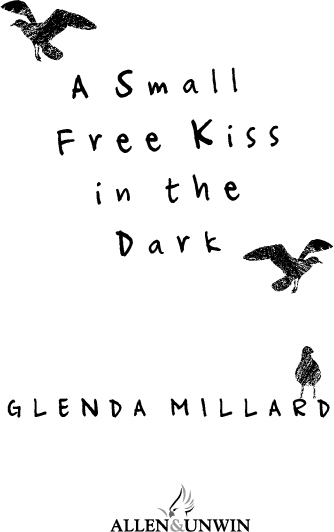A Small Free Kiss in the Dark



‘This book shows how the kindness of strangers can often be purest, and how those who have nothing can be the richest people in the world.’
Anna, age 15
‘It made me think about what was important in life.’
Keely, age 14
Also by Glenda Millard
When the Angels Came
The Naming of Tishkin Silk
Bringing Reuben Home
The Novice
Layla, Queen of Hearts
Perry Angel’s Suitcase

Copyright © Glenda Millard, 2009
First published in 2009
All rights reserved. No part of this book may be reproduced or transmitted in any form or by any means, electronic or mechanical, including photocopying, recording or by any information storage and retrieval system, without prior permission in writing from the publisher. The
Australian Copyright Act 1968
(the Act) allows a maximum of one chapter or ten per cent of this book, whichever is the greater, to be photocopied by any educational institution for its educational purposes provided that the educational institution (or body that administers it) has given a remuneration notice to Copyright Agency Limited (CAL) under the Act.
Allen & Unwin
83 Alexander St
Crows Nest NSW 2065
Australia
Phone: (61 2) 8425 0100
Fax: (61 2) 9906 2218
Email: [email protected]
Web:
www.allenandunwin.com
National Library of Australia
Cataloguing-in-Publication entry:
Millard, Glenda.
A small free kiss in the dark / Glenda Millard.
ISBN 978 1 74175 658 6
A823.3
Cover and text design by Lisa White
Set in 11.5/18 pt Electra Regular by Midland Typesetters, Australia
Printed in Australia by McPherson’s Printing Group
10 9 8 7 6 5 4 3 2 1
For Douglas
G.M.



Contents
1 Permission not to have a friend
2 Vincent and the wedding birds
8 The Carousel of War and Peace
10 The ballerina, the baby and the brave
14 The Guru of Noticing Details


A fun park isn’t the kind of place you’d expect to find a ballerina
on a rainy afternoon. But that’s where we found Tia.
In the beginning I wished we never found her. Three was
perfect: Billy and Max and me. We didn’t need anyone else
to look after, especially not a ballerina. Worse still, she had
a baby. You couldn’t choose just one; they came together,
like a free sample of mayonnaise sticky-taped to a bag of
salad leaves.
The girl didn’t look like a ballerina when we found her.
She just looked like a girl wearing a long red coat
and black motorbike boots that were way too big for her
skinny legs. Her skin was the colour of the moon and her
long hair blew around her face like threads of spider web.
She was sitting sideways on a white horse, like ladies in the
olden days did. The baby was just a lump inside her coat.
Rain dripped off the roof of the carousel and made it look
like a giant-size crystal chandelier, except you don’t get
wooden horses on chandeliers.
We were gobsmacked to see the girl because not many
people visit fun parks that don’t work, especially when
there’s a war going on.

Permission not to
have a friend
Skip was my running-away name. It seemed like a good name because of how I skipped school whenever I was doing a runner. I still liked it, even after I found out that’s what you call the massive metal bins that demolition crews dump their rubbish in. A skip is somewhere you can shelter when there’s nowhere else, and getting a new name is a bit like being born all over again. I hoped my new life would be better than the one I’d left behind.
It was easy, once I decided to go. I made a plan and I kept it in my head because everyone knows you should never write a plan down in case someone else finds it. Even though it was the last day of term, before the holidays, I still went to school. That was part of my plan. If I didn’t turn up the teachers would ring my caseworker because they knew I’d run away before, only then I hadn’t made a plan so it was easy for them to find me. I heard the other kids telling their friends what they were going to do after school and in the holidays. Some were going to the beach and others were going to stay with their grandmother or their aunty or someone else they were related to. I didn’t tell anyone what I was going to do. That was part of my plan, too. I even had a strategy for an unlikely event. If someone asked me over to their place after school, that would be an unlikely event because people only ask you to their house if they’re your friend. But if anyone did, my strategy was to pretend not to hear.
